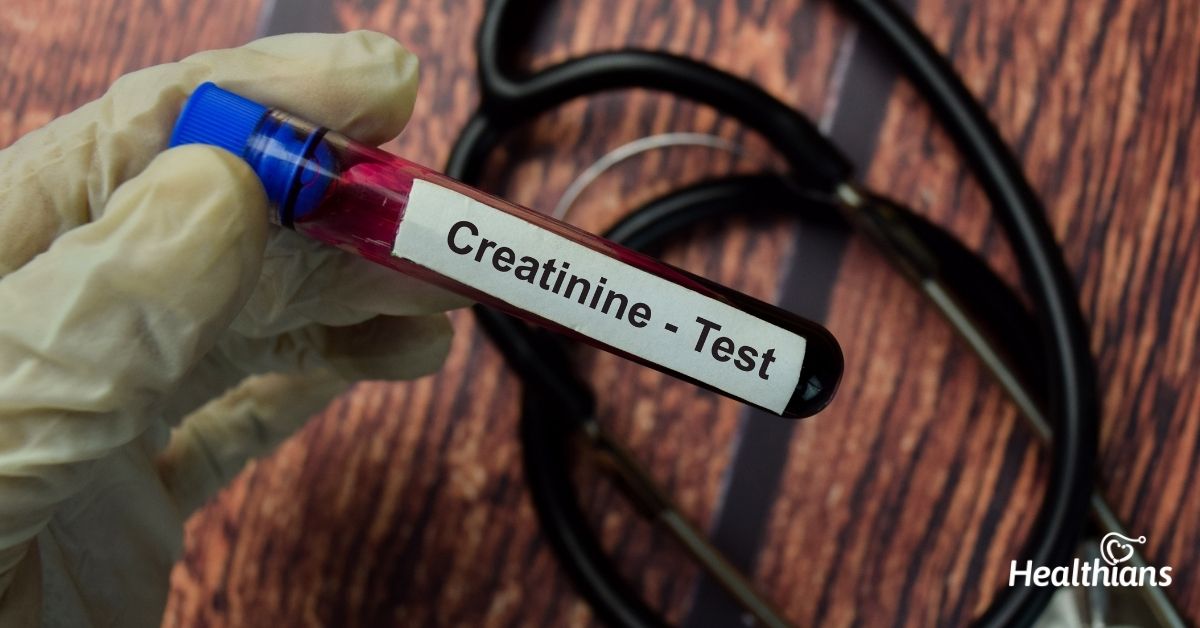Contributed by – Healthians Team
What is the Creatinine Serum test?
Malfunctioning kidneys can be detected using the Creatinine Serum test. A creatinine serum test evaluates the levels of creatinine in your blood, which indicates whether your kidneys are working properly or not.
Creatinine is actually a chemical waste product that is produced by the muscles. Healthy kidneys filter this waste material out of the blood in the form of urine. Unhealthy kidneys are unable to filter out the creatinine from the blood.
Serum creatinine level is proportionate to muscle mass; therefore, the normal value of an individual’s serum creatinine level will be dependent on the individual’s size and their overall muscle mass. Since men tend to have greater muscle mass, they usually have higher creatinine levels than women. Likewise, the normal creatinine level of athletes may be higher than that of non-athletes. Elderly individuals have a relatively lower presence of creatinine levels than normal.
Who should get a Creatinine Serum test?
We know that the likelihood of abnormality in renal functioning is substantially higher in patients above 60 years of age. We also know that those who have certain illnesses, such as diabetes, high blood pressure, family history of kidney problems and heart disease are at risk for kidney disease. It is important that people who are at high risk have their kidney health assessed regularly.
Why is the Creatinine Serum test needed?
When your kidneys malfunction, you begin experiencing a lot of health problems including:
- Nausea and vomiting
- A loss of appetite
- Tiredness and weakness
- Trouble sleeping
- Changes in urine output
- Swollen feet and ankles
So, early detection of problematic kidneys can significantly help prevent or manage these health conditions that cause deterioration in kidney function.
Also, in early stages of kidney disease, many people experience few or no symptoms. So kidney impairment often goes undetected and undiagnosed until the disease is well-advanced. Therefore getting tested is the only way to monitor if your kidneys are healthy.
What does a Creatinine Serum test result mean?
The diagnostic criterion for ideal range for blood creatinine is 0.84 to 1.21 milligrams per decilitre (74.3 to 107 micromoles per litre). However, this can vary from lab to lab, between men and women, and by age.
Lower than normal results
Your creatinine blood level may be lower than normal if you have a muscle disease, such as myasthenia gravis or muscular dystrophy. This could also be indicative that your body’s iron stores are low and you have iron deficiency. As a result, you could be anaemic.
Higher than normal results
If serum creatinine levels are truly higher than normal, that isn’t a good thing. A rise in blood creatinine level indicates that you have a condition that causes your body to store too much iron. A large number of chronic diseases display an elevated creatinine concentration, diagnosis of which might require further investigation.
How is the Creatinine Serum test done?
This test requires a sample of blood to be drawn from a vein, usually from the forearm. There is usually no special preparation required prior to the test. Fasting isn’t necessary. The blood sample is sent to a lab for clinical analysis. You can return to your usual activities immediately.




